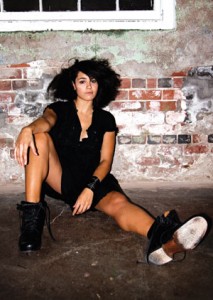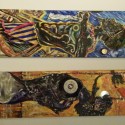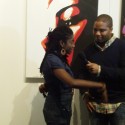Zaki Ibrahim Making a Soulful Name For Herself
It’s a cold and rainy night in Toronto but that hasn’t stopped a near-capacity crowd from gathering at the Mod Club to see much buzzed-about vocalist Zaki Ibrahim perform. Midway through her rapturously received set, Ibrahim stops the proceedings to blow bubbles with her band members and welcome two teenaged girls to the stage.
The duo is a group named Wee Golden and the teenage band sings folk songs and plays the thumb piano (known as the kalimba). Ibrahim cedes the spotlight to their warmly received performance before she triumphantly resumes her headlining set. It’s an intriguing move, since taking a backseat mid-set isn’t exactly what many would expect of a vocalist whose profile is growing exponentially.
A few days after the show, the Toronto-based vocalist talks about the Wee Golden set in the middle of her show. “A lot of people were saying it really didn’t fit, but that was kinda the point,” Ibrahim says. And the bubbles? “It was just to make the environment comfortable for the two 14- and 15-year-old girls…. They were nervous as hell.
“They just write beautiful songs, and it was just an opportunity to let them experience something like that. It was like two little golden angels with golden songs — and with bubbles.”
Ibrahim’s fiercely protective concern for the group is by no means an accident. Her selfless attitude of putting others before herself is an attitude that is applicable to many things in her life and is deeply reflected in her own music.
If you happened to have gotten a chance to hear Ibrahim’s 2006 EP Sho (Iqra in Orange), which has been mainly available through her live shows over the past couple of years, the singer’s generous attitude wouldn’t be totally surprising to you.
Behind Ibrahim’s soulfully eclectic mélange of R&B, hiphop and jazz is her impressive lyrical stance exhibiting a deep concern for others, establishing itself as a theme on tracks like the reggae-tinged “Connected Mattalike” and the gritty catchiness of “Grow.” While a cynic might scoff at the optimism and hope evident on the undeniable head-nodder “Daylight” as being naïve, it’s extremely hard to dismiss Ibrahim’s voice, infused with impassioned verve. She credits her parents with her disarmingly positive outlook.
“They raised my brothers and sisters to be a little bit more conscious of what goes on around you and to try to put yourself in someone else’s shoes,” Ibrahim says.
Her father is Zane Ibrahim, a renowned percussionist and long-time anti-apartheid activist in South Africa, who helped to found one of the country’s first community radio stations. Though she was born in Vancouver, Ibrahim spent much of her youth in South Africa. She is “fascinated” by the country and has often returned there for extended periods of time. While there, she has helped to organize self-expression workshops for young offenders in South African prisons, some who she humorously remembers mistook her for American R&B artist Alicia Keys.
Ibrahim says crowds can be tough to musical performers in Cape Town, but her toughest critics when she first began to dabble in music as a child was her own family.
“I always got heckled by them,” Ibrahim says. “And it didn’t matter what I was doing, I’d be telling a story like, ‘We need to bring justice to a situation,’ and everyone would be laughing and I’d be crying because I’d be like ‘It’s about a duck that died because of pollution,’” she recalls laughing.
“And it would be a funny experience for them. And I would be like, ‘Ah! How am I gonna let them know the truth?’”
Those early experiences have clearly made her very resilient. Recalling being booed by a rowdy crowd at the famed New York Apollo Theater a couple of years ago for performing Sade’s “Sweetest Taboo” over Snoop Dogg’s “Drop It Like It’s Hot” instrumental, Ibrahim giggles constantly and calls it “a really, really amazing positive memory.” She’s clearly ready to take on what the music industry might throw at her.
Having recently signed a deal with the Red Ink/SonyBMG label in Canada, Ibrahim is preparing the release of her second EP. Sho (Iqra in Orange), her first EP, dealt with love, nurturing and sensuality in relation to the word iqra, which means to constantly seek knowledge in Arabic. However, Ibrahim says her second EP, Eclectica in Purple, due out in May, will deal with “more heartbreak” and will be more outspoken and delve into Afrobeat.
Later in the year, Ibrahim will also release her full-length debut entitled Every Opposite. It will incorporate Ibrahim’s already established organically soulful sound, with nods to electronic sounds from the ‘80s and hip-hop beats, and be a mesh of intentionally different sounds and messages to reflect the album’s title. Ibrahim hopes to bring the album to life with a play using the resources of the District Six Collective who work with her on all her projects.
The collective is actually named after District Six, a racially integrated area of Cape Town that thrived for years during the apartheid regime until the government declared it a “whites only” area in 1966 and razed it to the ground in 1970. Ibrahim actually had family members that lived in District Six.
District Six, the Toronto-based record label and management company, was founded by Dave Guenette after his travels through South Africa. And while Ibrahim may be one of the most visible affiliate of the collective, she has used her profile to provide opportunities to the other artists who range from DJs to filmmakers to also have their voices heard in accordance with the collective’s modus operandi.
It’s just another example of Ibrahim’s penchant for deflecting attention away from herself, even as the spotlight and the buzz around her as a recording artist continues to grow.
It’s not surprising that when she talks about how she would define success and her future, it doesn’t take her long to, yet again, talk about the welfare of others.
“I think the definition of success for me is to be somewhat effective in putting my music across, and if it’s not music, it’s being able to express myself in some way,” Ibrahim says.
“Living a normal life, just having my health … travel and that kind of stuff. Those are the golden thoughts y’know,” she says. “I’d like to be a stand-up person and feel successful, to be a healthy person, so I can be like healthy for others.
I’m not trying to be clichéd about it, but honestly that spells success.”
Originally published in Sway Magazine, Spring 2008 issue.







Leave your response!